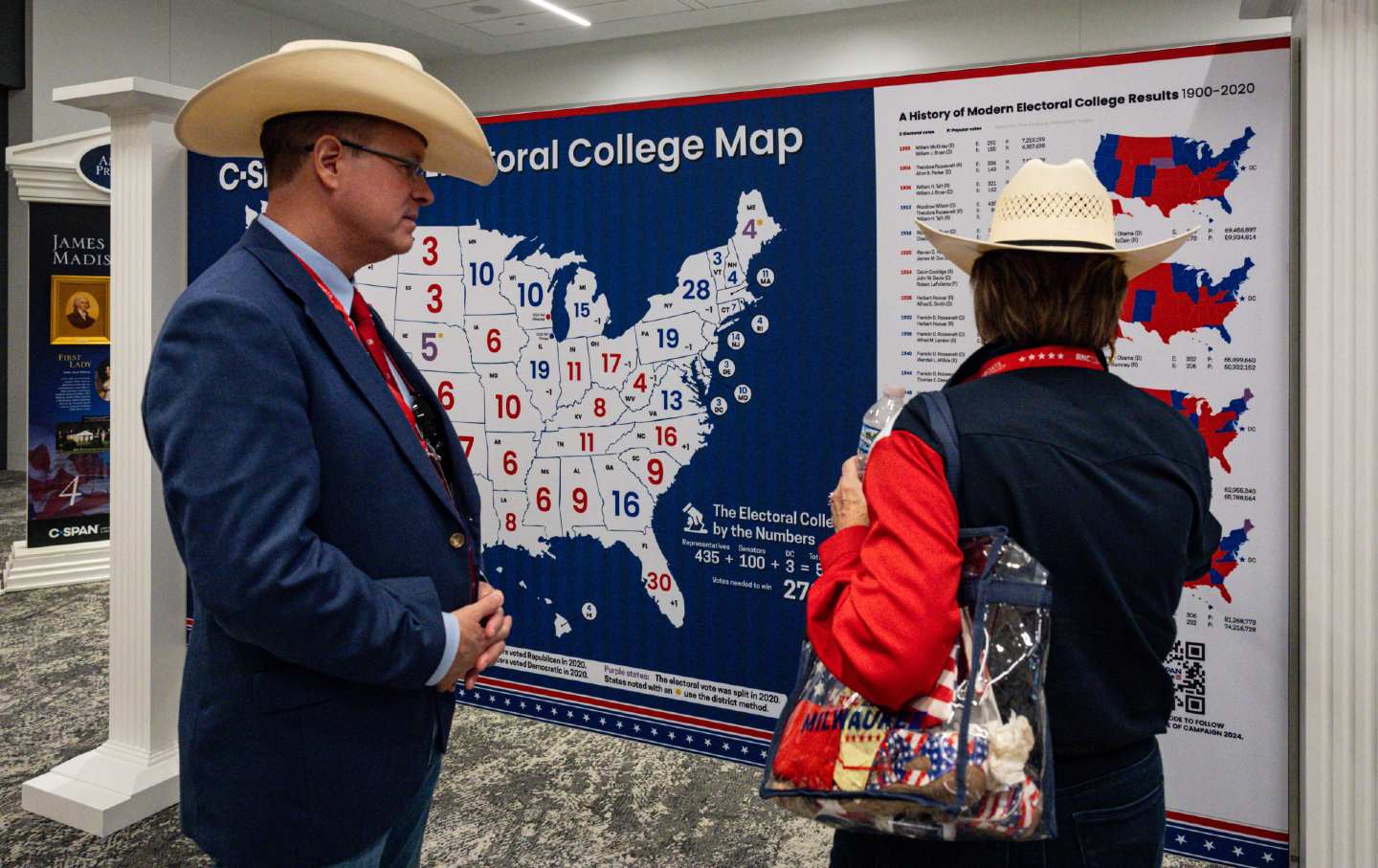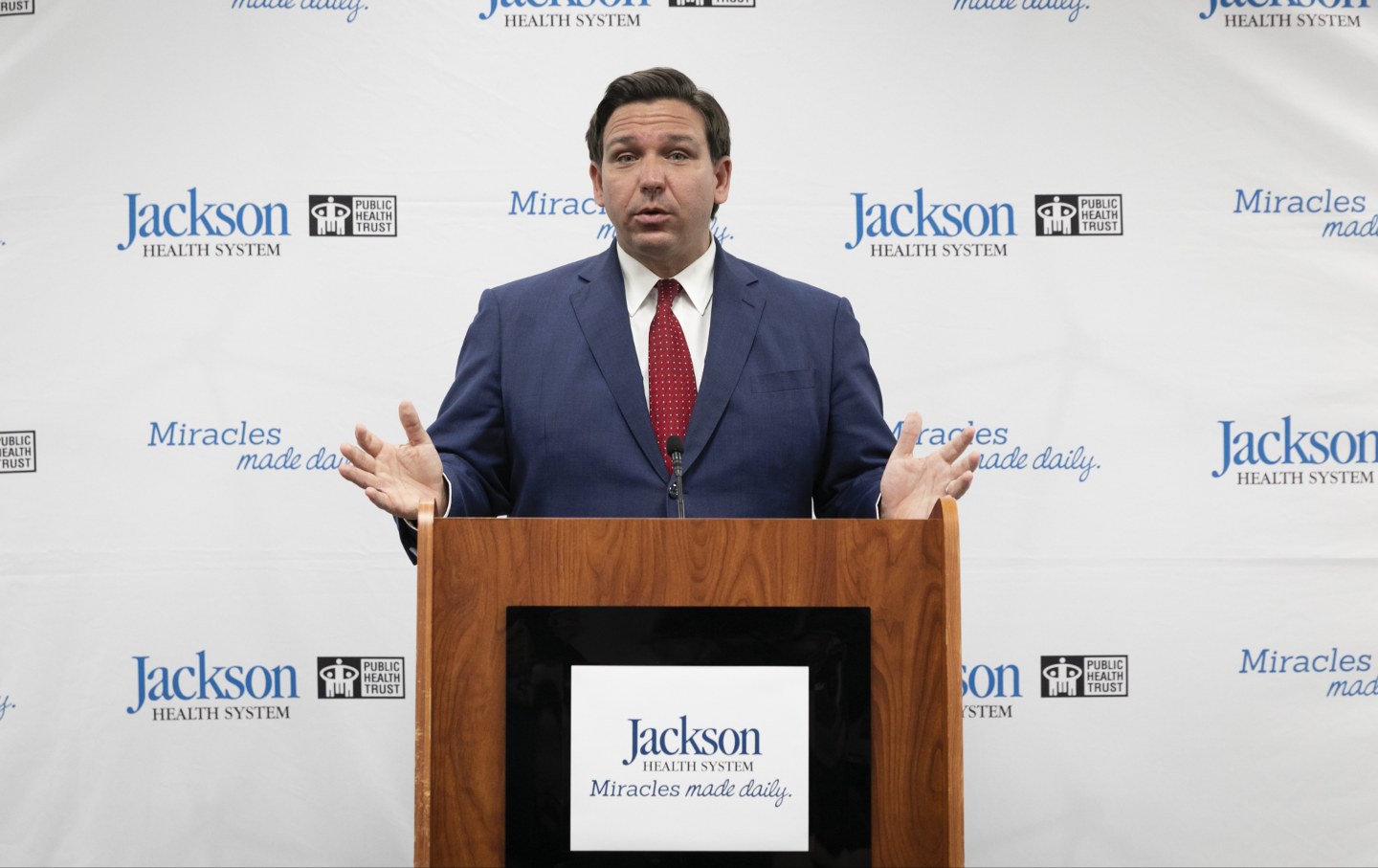
[ad_1]
Politics
/
October 10, 2024
Both parties are competing to see who can keep propping up the same old failed myths about immigration.

Kamala Harris visits the US-Mexico border with US Border Patrol Tucson sector chief John Modlin (R) in Douglas, Arizona, on September 27, 2024.
(Rebecca Noble / AFP via Getty Images)
Vice President Kamala Harris and former president Donald Trump are competing over who can appear tougher on immigration, particularly at the US-Mexico border. Their approach is both unfortunate and mistaken.
During last month’s presidential debate, Harris boasted that she had supported a border bill that would have “put 1,500 more border agents on the border to help those folks who are working there right now over time trying to do their job [and] put more resources to allow us to prosecute transnational criminal organizations for trafficking in guns, drugs and human beings.”
Current Issue

For his part, Trump said, multiple times, “We [are] allowing these millions of people to come through on the southern border,” adding that he would “sign a bill to close up the border.” In response to a question about his proposal for the largest domestic deportation operation in the history of the country using the National Guard, Trump said he would also use “local police.” Trump also used derogatory language (not worth repeating) in describing immigrants.
We have seen this movie before. US presidents from both parties have been implementing “tough,” often deadly, policies at the border for 30 years. They haven’t worked. It’s time for US leaders to acknowledge the folly of policies aimed at deterring immigration and to rethink how borders can be managed in a way that respects human rights.
Starting with the presidency of Bill Clinton, the US government has deliberately used an increasingly punitive and deadly “prevention through deterrence” strategy to dissuade migration to the US-Mexico border. First implemented by the Border Patrol in August 1994, “prevention through deterrence” and its subsequent permutations have aimed to funnel migrants into increasingly life-threatening conditions as a way to dissuade them from crossing the border.
Deterrence policies have included increased prosecutions and incarcerations for minor legal offenses, building border walls, deploying more agents and invasive surveillance technologies, and removing people quickly and without due process. The government has unlawfully blocked people from applying for asylum, separated children from their parents or caregivers, and forced non-Mexicans to wait in Mexico for months while they use a faulty (by the government’s own admission) phone app to schedule an immigration appointment — all while facing abuse and violence from Mexican criminal groups and corrupt local officials.
These policies may lead to a reduction in border crossings for a brief time. We are now seeing a drop in migrant encounters at the US-Mexico border after the Biden administration’s latest asylum ban proclamation and the heightened, often abusive, interdiction efforts of Mexican officials.
But we know from decades of experience that the pendulum eventually swings back, no matter how much pain our policies inflict. That’s largely because deterrence tactics do not address why people are moving, which is often to live together with their family members in the United States or to find a better, safer life for themselves.
And worse, even as the numbers of encounters drop, deaths of migrants appear to be on the rise. Border Patrol’s El Paso Sector officials, for example, reported finding record numbers of human remains in recent months. Instead of dissuading migrants from coming, these policies are pushing them into crossing through the most remote and deadlier parts of the borderlands.
In 2022 (the latest year for which border-wide data is available), Border Patrol documented more than 850 human remains found in the borderlands. Since 1994, Border Patrol has recorded nearly 10,000 human remains, including of women, pregnant people, and children and toddlers. Unfortunately, deterrence efforts at the US-Mexico border contribute to tragic and increasing numbers of deaths and disappearances of people who come to the US in search of safety, to reunite with family members, or to find a better life.
Regardless of who is president, it is time for the United States to pursue a new approach that prevents needless deaths and is solidly grounded in international human rights and refugee standards, including policies that respect, at a minimum, the human right to life and family unity.
Ad Policy
For a fraction of the billions of taxpayer dollars spent on hardening the border, the US government could invest instead in a rights-respecting border management process that brings governmental and nongovernmental entities together to establish reception centers at ports of entry staffed by asylum officers and immigration judges, health professionals, trauma counselors, child welfare specialist, and other humanitarian services providers. Congress should also expand migration pathways that embrace the complex and multicausal reality of people’s movements.
Popular
“swipe left below to view more authors”Swipe →
And, US aspirants for political office should also change their rhetoric and talk instead about how immigrants make enormous contributions to the United States, including by strengthening the economy, providing health care, and broadening innovative and productive industries.
By doing so, the United States would set an example for other countries to follow.
Can we count on you?
In the coming election, the fate of our democracy and fundamental civil rights are on the ballot. The conservative architects of Project 2025 are scheming to institutionalize Donald Trump’s authoritarian vision across all levels of government if he should win.
We’ve already seen events that fill us with both dread and cautious optimism—throughout it all, The Nation has been a bulwark against misinformation and an advocate for bold, principled perspectives. Our dedicated writers have sat down with Kamala Harris and Bernie Sanders for interviews, unpacked the shallow right-wing populist appeals of J.D. Vance, and debated the pathway for a Democratic victory in November.
Stories like these and the one you just read are vital at this critical juncture in our country’s history. Now more than ever, we need clear-eyed and deeply reported independent journalism to make sense of the headlines and sort fact from fiction. Donate today and join our 160-year legacy of speaking truth to power and uplifting the voices of grassroots advocates.
Throughout 2024 and what is likely the defining election of our lifetimes, we need your support to continue publishing the insightful journalism you rely on.
Thank you,
The Editors of The Nation
Vicki B. Gaubeca
Vicki B. Gaubeca is associate director of US immigration and border policy at Human Rights Watch.
More from The Nation

All the problems with all the reasons some people claim the Electoral College is a good thing.
Elie Mystal

A new study shows that states dominated by conservatives have markedly worse health outcomes.
Gregg Gonsalves

He relished the limelight in 2016 and 2020. Now he’s refusing to debate and ducking interviews.
John Nichols

The former president, who turned 100 on October 1, and is in hospice care, said he is “only trying to make it to vote for Kamala Harris,” according to his grandson, Jason Carter.
OppArt
/
Colleen Quinn

This year’s Pray Vote Stand summit revealed fissures around Trump’s refusal to support a nationwide abortion ban.
Amy Littlefield

Democrat or Republican, the next presidency will still mean death for others in faraway places.
Ahmed Moor
[ad_2]